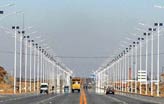Reform nation's coal mines
Updated: 2011-09-21 07:54
By Da Sulin (China Daily)
|
|||||||||
Ineffective supervision and weak law enforcement deeply rooted in the pursuit of profit result in too many lives lost
Figures show China has the worst safety record of all leading coal producers worldwide. And the situation lacks fundamental improvement in recent years. In 2009, China's coal production accounted for 37 percent of the world's total, but related deaths accounted for almost 70 percent, an official from the National Energy Bureau said.
What made mining coal in China so dangerous?
The primary cause lies in investors' unwillingness and inability to promote worker safety. Safety investment is a huge cost for a colliery. If the codes are strictly obeyed, the initial investment for even a small colliery with a producing capacity of 300,000 tons per year can exceed 100 million yuan. Most coal-producing countries set a high entry threshold for the industry because only long-term investors under strict supervision will take measures to ensure safety for workers.
But this is not the case in China, where there are two kinds of collieries: State-owned and township mines.
The former, directly managed and run by local governments, have a double identity as profit-seekers in the market economy and contributors to State coffers. Not many people responsible for accidents in State-owned collieries have been severely punished.
Most township coal mines are small enterprises with backward technology and little capital. They owe their survival to the shortage of coal in China, which has lowered the entry threshold for the industry. A considerable number of these are actually running in legal gray areas. And they are more geographically dispersed, which makes it more difficult to supervise them. Therefore, investors in township collieries lack both the ability and the strong will to promote safety.
Meanwhile, miners have yet to acquire the ability to negotiate for better safety conditions. Most, if not all, of the suffering miners are migrant workers, who, being inferior in the dual economy of urban and rural areas, are forced to exchange their labor for better living conditions for their families. All migrant workers understand how dangerous it is to work in a colliery, a job they describe as "digging coal from hell". But because they lack the skills and resources to find a job that provides equal pay, they have no other choice.
To make matters worse, the migrant workers are often from different places and lack the knowledge and ability to form an alliance against mining investors. Therefore they have no ability to ask mine managers for safety measures.
Considering the situation, the State should be providing the miners with assistance and protection. But loopholes in every part of China's colliery supervising system leave much room for improvement.
First, laws governing colliery safety are far from effective. China's mine safety laws have long been famous for their tolerance of violators. The highest fine for breaking safety codes is only 200,000 yuan ($31,350) a negligible amount compared with a coal mine's huge profits. The heaviest penalty is seven years in jail, which is also very light compared with most other coal-producing countries. To make matters worse, not all people responsible for miners' deaths are fully punished.
Besides, mine safety laws and regulations have only set basic principles and frameworks, but do not provide executable details. Thus, law enforcers often find it difficult to do their jobs. Even these rough law texts are often contradictory because they are coded by different government departments. This has further reduced the effectiveness of the law to maintain safety.
Second, State supervisors are limited in their roles. To reduce costs, the State coal mine supervising departments have set up branches only in some main coal-producing areas and supervise mainly State-owned coal mines, thus leaving township coal mines alone.
Most of the supervisors come from the coal industry administrations from which their department was recently separated. Complicated relations with colliery managers, especially those at the State-owned mines, have prevented them from independently supervising their former colleagues and ex-bosses.
Even if the supervisors were willing to watch their former bosses, they lack the power to do so. The State supervisors have the power to fine, suspend or shut down collieries, but they can neither forcefully execute these punishments nor charge mine owners if they resist. The fact is only a few mines are shut for falling short of safety standards.
With ample law enforcement resources and decisive influence over collieries within their territory, local governments are the only player in the game that can supervise them, but a strong will to do so is rare.
This has its deep roots in the economic structure of the coal-producing areas.
Most of China's collieries are in relatively underdeveloped regions where economic growth relies heavily upon selling resources. In the eyes of local officials, coal mines that offer great revenue are the best shortcut to promotion, and are thus worth protecting. The situation is often made worse in regions where corruption involves local officials investing in collieries.
In other words, the guiding principle in a number of areas is that economic development has surpassed coal miners' lives in importance, deactivating China's supervision of coal mines.
Only a thorough reform of the related legal system, economic structure and coal mining institutions will improve the safety situation.
The author is a professor of public governance at Nanjing University.
(China Daily 09/21/2011 page8)










